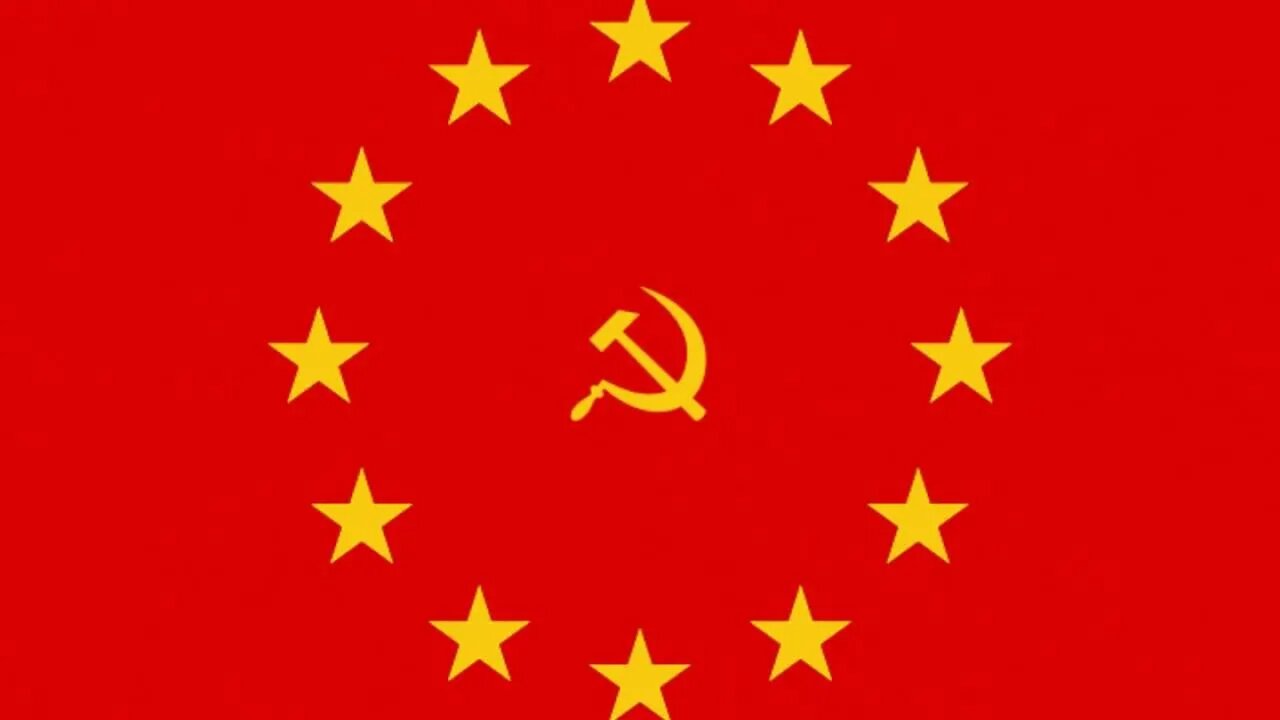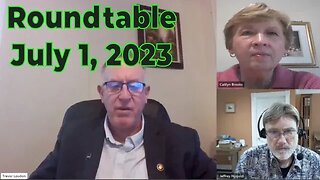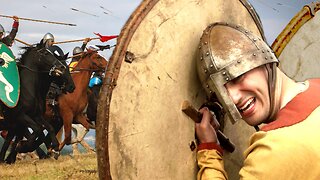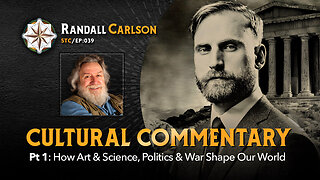Premium Only Content

European Union Collective – Christopher Story – Part 1.6 – Europe From the Atlantic to Vladivostok
Christopher Story "died under mysterious circumstances" after writing this book. He was an adviser on intelligence matters to Prime Minister Thatcher and published Soviet Analyst for many years. In the opinion of many he was better informed than British and US intelligence organisations put together. This book is a daring analysis of the plans of two major players in the battle for Europe's destiny. One is Germany and the dream of a Pan-Germany. The other is Russia, which had plans since the Soviet era.
In our days, the EU is seen as an enemy of the nations it comprises, thus Christopher Story thinks. He is able to see a "German and Russian strategy to complete Lenin's World Revolution.
https://www.amazon.com/European-Union-Collective-Member-States/dp/1899798013
https://www.goodreads.com/en/book/show/9976147-european-union-collective
Notes and references:
55. 'Spies without Cloaks', Amy Knight, Princeton University Press, Princeton, New Jersey, 1996, Chapter One, page 20.
56. Report in 'Izvestia', 9th February 1991.
57. When he was Chancellor of the Exchequer, Sir Geoffrey Howe, who solicited this Author's advice as a currency and economic analyst on a number of occasions, appeared to be level-headed and sensible, to the point of being considered dull by the press corps. However after his appointment as Foreign Secretary, Sir Geoffrey went badly off the rails. This is made clear in his autobiography, Conflict of Loyalty [Macmillan, London-1994], which reveals that Howe had no understanding of Soviet deception strategy, and had absorbed Soviet disinformation like ink sinking into blotting paper. Howe's favourable remarks on MVD General Shevardnadze reveal a lack of judgment, as well. Even the CIA has come to acknowledge that, as Georgia's Communist Interior Minister, Howe's friend 'Shevardnadze arrested more than 15,000 people, including 17,000 members of the Communist Party, numerous Government Ministers and 70 KGB officials', and 'was responsible for the torture and execution of many innocent people, including dissidents'.
58. Letter from John McGregor, leader of the House of Commons, to [Sir] Michael Spicer MP, a copy of which was furnished to the Author by Sir Michael, dated 28th October 1991, ref: ADS/AG.
59. See 'The Perestroika Deception', Anatoliy Golitsyn, op. cit., Editor's Note, page 59.
60. See 'Soviet Analyst', Volume 24, Number 1, page 5.
61. See The Perestroika Deception', Anatoliy Golitsyn, op. cit, Memorandum dated September-October 1990, page 123.
62. See The Perestroika Deception', op. cit, Memorandum dated 26 March 1992, page 151.
63. Interview with Eduard Shevardnadze conducted by Valentin Zorin, 'Undiplomatic Conversations' programme, Central Television, First All-Union Programme, 1940 GMT, 19th November 1991, recorded before the MVD General's reappointment as USSR Minister of External Affairs, BBC Monitoring Service, SU/1235, A1/1,21 November 1991.
64. 'Political Affairs', May 1991, Volume LXX, Number 5, pages 14-16, 'An Observation on Economic Changes in the Soviet Union', by Carl Bloice, a member of the National Committee of the CPUSA and Moscow-based correspondent of the CPUSA's 'People's Weekly World'.
65. Communication to the author from the Lenin expert, Dr Paul Busiek, of Springfield, Missouri, who befriended Bloice by subterfuge and confirmed the importance of this member of the CPUSA National Committee and his access to the Kremlin under Gorbachev when Bloice worked as Moscow correspondent of the 'People's Weekly World'.
66. 'Special' is routinely used by the Soviets to mean 'secret'. For instance, see 'Stalin's Masterpiece', Joel Carmichael, 1976 [New York, St Martin's Press, page 11]: There had once been a 'Secret Section' of the Central Committee; it held the confidential dossiers of the Party and of the Government. As Stalin's apparatus took shape, the Secret Section, after subsiding apparently for a while, was revived again and incorporated in his private cabinet as the Special Section'. This
time its activities were not only really secret, but even its existence was not officially known until 1934; at no time was it confirmed or discussed in any official Party papers.
67. Carl Bloice's quotation revealing that Gorbachev's 'perestroika' was modelled on Lenin's 'New Economic Policy', and that 'special methods' were being used, with the revolutionaries 'in many ways... operating differently from the way they were operating before' and 'drawing back in order to make better preparations for a new offensive against capitalism'. These are quotes from Vladimir I. Lenin, 'Draft Thesis on the Role and Functions of Trade Unions Under the New Economic Policy', prepared on 28th December 1921 and approved two weeks later by the Party's Political Bureau; 'Collected Works', Progress Publishers, Moscow, 1969, Volume 42, page 375.
#EuropeanUnion #Collectivism #Deception
-
 56:07
56:07
Eugen Richter Audiobooks
1 year agoMutiny in Russia, War in Ukraine: A Panel Discussion • Jeff Nyquist, Trevor Loudon, Clare Lopez
457 -
 LIVE
LIVE
Vigilant News Network
8 hours agoBombshell Study Reveals Where the COVID Vaccine Deaths Are Hiding | Media Blackout
2,204 watching -
 1:17:59
1:17:59
Sarah Westall
4 hours agoDOGE: Crime & Hysteria bringing the Critics & the Fearful - Plus new CDC/Ukraine Crime w/ Dr Fleming
10.1K2 -
 45:39
45:39
Survive History
9 hours ago $0.33 earnedCould You Survive in the Shield Wall at the Battle of Hastings?
6.49K5 -
 1:50:28
1:50:28
TheDozenPodcast
8 hours agoViolence, Abuse, Jail, Reform: Michael Maisey
13.4K1 -
 23:01
23:01
Mrgunsngear
1 day ago $2.94 earnedWolfpack Armory AW15 MK5 AR-15 Review 🇺🇸
29.3K12 -
 25:59
25:59
TampaAerialMedia
1 day ago $0.72 earnedUpdate ANNA MARIA ISLAND 2025
13.1K1 -
 59:31
59:31
Squaring The Circle, A Randall Carlson Podcast
10 hours ago#039: How Politics & War, Art & Science Shape Our World; A Cultural Commentary From Randall Carlson
10.4K2 -
 13:21
13:21
Misha Petrov
10 hours agoThe CRINGIEST Thing I Have Ever Seen…
9.2K36 -
 11:45
11:45
BIG NEM
6 hours agoWe Blind Taste Tested the Best Jollof in Toronto 🇳🇬🇬🇭
5.02K